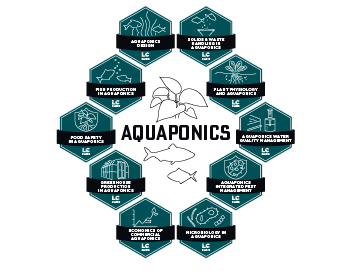 This Aquaponics series includes the following courses:
This Aquaponics series includes the following courses:
Integrated Pest Management:
Integrated Pest Management (IPM) is the process of detecting, diagnosing and managing pest problems. It includes preventative strategies, risk assessment, curative or reactive methods, and evaluation of success. In this course, the learner will explore the principles underlying IPM to develop a decision support system to facilitate pest management in an aquaponics system. A variety of methods for detecting pests in the crop will be examined to support pest identification and risk assessment. Management methods, including preventative, reactive, and biological, will be examined and assessed for their efficacy and appropriateness for use in an aquaponic system. The learner will be able to assess the effectiveness of an IPM plan based on a cost/benefit analysis.
Design Microcredential:
This course is an overview of aquaponics systems, their components, and their relative strengths and weaknesses under certain conditions. Focus will be on aquaponics grow methods, describing the function of the components of aquaponics systems, as well as describing the advantages and disadvantages of different grow methods under different conditions. Through this course users will learn that aquaponics functions as a complex, integrated system.
Water Quality Management:
"Recirculating systems are mechanically sophisticated and biologically complex. Component failures, poor water quality, stress, diseases, and off-flavor are common problems in poorly managed recirculating systems" (Masser, et al., 1999, p. 1).
This module's focus is water quality. As an aquaponics operator, you "must have a good understanding of water quality chemistry, be able to accurately use meters and chemical test kits, and take the proper actions to quickly correct problems" (Damron, 2013, p. 502).
Economics of Commercial Aquaponics:
This micro-course is about the consequences of
- individual decision making under conditions of scarcity and uncertainty; and
- interactions among individuals in the marketplace.
Students will become proficient in identifying and delineating these consequences using aquaponics as the focal point.
Fish Production:
In this module, you will complete readings and exercises with the goal of understanding the basic needs of cultured fish in not only recirculating aquaculture systems but, specifically, aquaponics—because it's not the same. We will also outline the nitrogen cycle, and explain its importance to the basic aquaponics function.
Food Safety:
Food Safety in Aquaponics provides a basic understanding of how the systems components (water, plant bed, fish tank, waste handling, etc.) and different stages of your aquaponics operation (seeding, germination, transplanting, production, packaging and transport) must be scrutinized to protect your plant and fish products so that they don't become compromised.
Greenhouse Production:
In this course, you'll complete readings and exercises that will allow you to better understand the specifics of growing plants in protected environments such as greenhouses. This micro-credential covers a broad range of information, from which types of greenhouses and crops are most commonly used in the industry, to the different hydroponic growing techniques, and the main environmental parameters that affect plant production in the greenhouse part of your aquaponics system. At the end of the course, you'll complete a quiz that will assess your comprehension of this content.
Solids & Waste Handling:
Handling of solids using aerobic bioreactor technology will take your aquaponics system to another level of sustainability and efficiency with the added benefits of greater productivity and reduced risk. The course begins by briefly presenting the concept of waste and examines how waste has historically been handled. We'll then discuss how current technologies can be used to capture and process solids most efficiently. Through describing the role of microbiology in the processes that transform suspended solids into the dissolved nutrients our systems plants require, we'll explore the importance of solids handling in aquaponics.
Plant Physiology:
Your plants are probably the most recognizable component of your aquaponics system and definitely the most valuable in terms of revenue, whether you plan on going commercial or not. This microcredential begins by reviewing the basic structure and function of plants in general. This will form the basis of the environmental conditions you need to control (and why) so that your plants flourish. The appearance and diagnosis of plants who do not receive the proper nutrients is also a key component of diagnosing the health status of your plants and what to do about it.
Microbiology of Aquaponics:
Though there is much still to learn about the microscopic ecosystem that is fundamental to every aquaponics system, we know a lot about the essential factors that can help us manage our systems for maximum stability and production. We will briefly review with you the history of microbiology and present to you the various microscopic life forms that make your aquaponics system their home. The functions that the microbiome plays in your aquaponics system is extremely important to the success of your plants and fish, and includes more than simply maintaining the function of the biofilter. The maintenance and monitoring of your system for several important parameters will allow you to maintain it and predict your growing success, as well as be on the lookout for some not so pleasant microbes that can wreak havoc on your plants, fish, or your system as a whole. We'll also explore the future of this area of study, which will dramatically alter existing aquaponics growing practices.